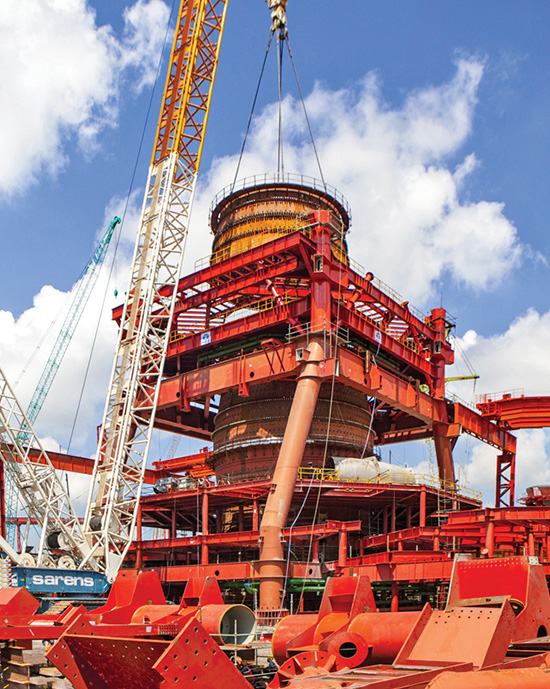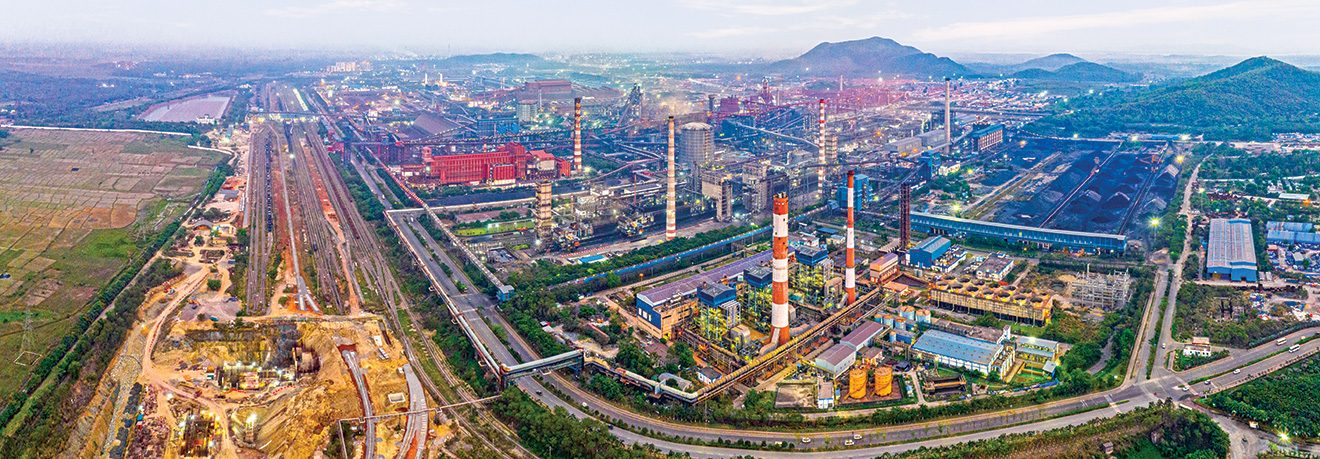Financial Capital
At Tata Steel, we are consistently driving optimal capital allocation to drive long-term sustainable returns for our stakeholders.
SDGs impacted
`0 crore
Cash generated from operations
`0 crore
Net Debt

Material issues addressed
- Greenhouse Gas Emissions and Climate Change Management
- Energy Efficiency/Energy Management
- Stakeholder Engagement
- Business Ethics, Integrity, and Transparency
- Corporate Governance
- Risk Management
Strategic linkages
SO1
SO2
SO3
SO4
Improvement savings
Tata Steel Limited
`0 crore
Tata Steel Nederland
€0 Mn
Tata Steel UK
£0 Mn
At Tata Steel, while we generate financial capital through our business operations and financing activities, we strive to optimise returns for our providers of financial capital and maximise surplus funds. We invest our surplus in attractive growth opportunities in our core market and raise finance based on prevailing market conditions, seeking optimal cost and flexible terms. Our long-term investments are strategically focussed on business sustainability and growth while maximising returns for our providers of financial capital.
During the past year, despite facing challenges such as inflation, high interest rates, and commodity price volatility, we demonstrated a resilient financial performance. The consolidated revenues stood at ₹2,43,353 crore and consolidated EBITDA at ₹32,698 crore, with an EBITDA margin of c.13%. Consolidated Profit after Tax stood at ₹8,075 crore while cash flow from operations stood at ₹21,683 crore. Considering the performance, the Board recommended a dividend of ₹3.60 per fully paid-up equity share.
Adverse realisations stemming from elevated commodity prices and volatile steel prices had an adverse impact on our working capital. However, we effectively managed to maintain control over our debt levels on a gross basis through optimisation of cash flows and rigorous operational management. In India, our cost improvement initiatives through Shikhar25 yielded significant savings and value protection of c. ₹6,309 crore while in Europe, our Sustainable Profits Programmes generated savings of c. €112 million and c. £52 million for Tata Steel Nederland and Tata Steel UK respectively.

Blast Furnace installation at Tata Steel Kalinganagar

Aerial view of Tata Steel Kalinganagar
`0 crore
Consolidated capital expenditure (FY2022-23)
In India, despite RBI increasing benchmark rates, we diligently kept our cost of capital in check through long-term/short-term rate arbitrage and a balanced mix of fixed and floating rate debt. To support our growth aspirations, we engaged in capital raising activities through a two-tranche NCD issuance at competitive yields, totalling ₹4,150 crore, which garnered strong investor interest. Additionally, we also ventured into overseas bond issuances for furthering our growth plans. By leveraging our longstanding relationships with lenders, we have been able to secure funds on favourable terms across our range of requirements.
Prudent capital allocation remained our central focus, with a key emphasis on striking a balance between growth ambitions and maintaining liquidity and a healthy balance sheet. We sought an optimal capital mix to fuel our growth aspirations. During the past year, we directed our financial capital towards strengthening our Indian operations and completion of the ongoing 5 MnTPA expansion at the Kalinganagar Plant and enhance our position in high-end value-added segments. Of the total consolidated capital expenditure of c. ₹14,142 crore, we allocated over c. ₹6,200 crore towards speedy completion of the ongoing Kalinganagar Project which included commissioning of value accretive 6 MnTPA Pellet Plant and Pickling Line & Tandem Cold Mill as part of the build of the 2.2 MnTPA Cold Rolling Mill Complex, aligning with our vision to become a 40 MnTPA company, in India, by 2030.
Furthermore, as part of our decarbonisation strategy, we allocated ₹2,600 crore towards the establishment of a 0.75 MnTPA Scrap and EAF based long products plant with a targeted completion by FY2024-25.
We also successfully completed the acquisition of Neelachal Ispat Nigam limited (NINL) at an investment of ₹12,100 crore and restarted operations within 3 months of its acquisition.
In Europe, we allocated a capital of €65 million for transitioning to steel production through Direct Reduced Iron process using green hydrogen, facilitated by an Expression of Principles on decarbonisation signed with the Dutch Government for our IJmuidden plant. We have also undertaken the blast furnace relining project at the cost of c. €125 million. Furthermore, at Tata Steel Nederland BV we are diligently building a strong cash reserve position to facilitate our green transition.
Looking ahead to the current financial year, with a planned capital expenditure of ₹16,000 crore, we plan to accelerate capital expenditures to complete Kalinganagar expansion and pursue downstream projects in India that create additional value.
As for the debt deleveraging, we prioritised deleveraging over the last few years and brought down the gross debt by ₹40,767 crore over FY 2020-21 and FY2021-22, with the gross debt of ₹75,561 crore outstanding as on March 31, 2022. We intend to strike a balance between growth and deleveraging. Accordingly, we allocated large capital towards the acquisition of NINL and towards growth capital expenditure in India. Allocation of capital for growth, coupled with higher volatility in earnings & working capital requirements resulted in the consolidated gross debt of Tata Steel to increase in FY2022-23 to ₹84,893 crore as on March 31, 2023, with strong credit metrices. However, we intend to resume and continue deleveraging efforts in the current financial year, with a target of reducing debt by US$1 billion. Additionally, we plan to release more working capital through inventory liquidation and enhance internal cash flow.
Also, the amalgamation of eight group companies into Tata Steel Limited, which is underway, is expected to create operational efficiencies, reduce cost and generate financial synergy in the coming years.
For our UK operations, during the last year, we effectively addressed the future funding risk stemming from asset-liability mismatches in the British Steel Pension Scheme (BSPS) through an insurance buy-in of up to 62% of the BSPS liability. The remaining 38% has also been transferred to the insurance company in Q1 FY2023-24.
Our disciplined approach to managing financial capital saw the international rating agencies reaffirm the Corporate family ratings, ‘BBB-’ by S&P and ‘Ba1’ by Moody’s. Both agencies revised their outlook from "Stable" to "Positive." Domestic rating agencies too reaffirmed an AA+ rating, indicating a strong credit profile and robust operating performance.
On the sustainability front, aligning with the carbon neutrality and leadership in ESG ambitions, in India, we use a carbon-adjusted internal cost of capital of US$ 40 per tonne of CO2 for capital project appraisals. This strategic approach will ensure alignment between capital allocation and our long-term decarbonisation strategy. Moreover, we are exploring avenues to raise green financing to support investments in sustainability-related initiatives.
Overall, our financial performance and capital management strategies are geared towards maximising returns, driving growth, and ensuring the long-term sustainability and success of our business.